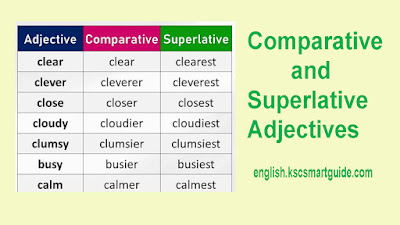Comparative and Superlative Adjectives
Comparative adjectives compare two things. Superlative adjectives compare more than two things
Comparative and Superlative Adjectives: Learn about Adjectives in this post as part of English Grammar. See also other posts for more details. If possible try to find out for English Grammar Rules. The "English Grammar Rules" can be viewed through the following links.
Click Here : "English Grammar Rules"
Commonly, adjectives that contain only one syllable or end in 'y' use 'er' to form comparatives and 'est' to form superlatives. For adjectives ending in y, change the 'y' to 'i' before adding the 'er' or 'est'.
- old – older – oldest
- young – younger – youngest
- pretty – prettier – prettiest
- long – longer – longest
- short – shorter – shortest
- bright – brighter – brightest
- close – closer – closest
- happy – happier - happiest
Click Here : Possessive Nouns
Adjectives with two or more syllables do not change but instead add more to form comparatives and most to form superlatives.
- respectable – more respectable – most respectable
- beautiful – more beautiful – most beautiful
- preferable – more preferable – most preferable
- hardworking – more hardworking – most hardworking
Click Here : Singular and Plural Nouns
Some adjectives have different forms of comparatives and superlatives.
- good – better – best
- bad – worse – worst
- little – less – least
- much (many) – more – most
- far – further - furthest
Read Also: Count Nouns vs Non-Count Nouns
The word than typically appears in comparative sentences.
- Amy is smarter than Betty.
- Chad is stronger than Dan.
- Greg is more diligent than his brother.
- I have more apples than he.
- She likes him more than me.
Read Also : 'Be' Verbs
Superlatives are typically accompanied by the word the.
- Tom is the oldest man in town.
- Paul is the tallest boy in the neighborhood.
- That shade of blue is the most beautiful color.
- This is the longest song that I have ever heard.
Read Also : Action Verbs

 K.S.Chowdary
K.S.Chowdary






%20-%20English%20Speaking%20Basics.jpg)
%20-%20English%20Speaking%20Basics%20-%20Part%20III.jpg)

